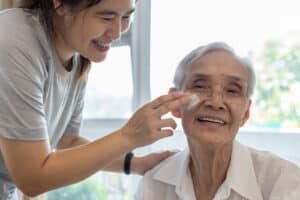
Like many other things, skin changes with age, leaving it more vulnerable to certain kinds of conditions. For seniors, keeping their skin healthy is essential for their overall health and well-being, as well as their appearance. With this in mind, it’s critical for seniors to understand common skin problems and how to prevent or treat them if they become an issue. The good news is that companion care at home is not only able to provide seniors with valuable information but also encourages them to talk with their medical team about any concerns. Some of the most common skin issues are explored below.
Dry Skin
Overview: Seniors frequently have dry skin thanks to a decreased production of natural oil as we age. Some of the signs include itchy and cracked skin or sharp, scaly areas.
Management and Prevention: Seniors should be encouraged to use gentle, scent-free soaps and lotions. Also, when they get out of the shower or tub, they should apply moisturizing lotion. Also, moisture can be added to the home through the use of a humidifier. Finally, companion care at home can encourage them to take shorter showers or baths to minimize the dryness of their skin.
Age Spots
Overview: Age spots, sometimes referred to as liver spots, are flat, brown, or black patches of skin that develop on parts of the body exposed to the sun, like the arms, hands, shoulders, and face.
Management and Prevention: To minimize the risk of sun spots, seniors should apply sunscreen when they leave the house with at least SPF 30. Also, companion care at home can encourage the use of hats and other protective clothing if seniors will be out in the sun for an extended period of time.
Skin Cancer
Overview: Aging also comes with an increased risk of skin cancer. Melanoma, squamous cell carcinoma, and basal cell carcinoma are the most prevalent kinds. Signs of skin cancer might be newly formed moles or alterations to current ones, as well as sores that won’t quite heal.
Management and Prevention: Seniors should check their skin regularly for any changes, and as mentioned, always apply sunscreen when leaving the house. However, the best way to manage or prevent skin cancer is to regularly meet with a dermatologist, who can provide professional monitoring.
Shingles
Overview: Shingles occurs when the chickenpox virus reactivates. It causes a rash and pain that makes it hard for seniors to complete their daily tasks. Signs of shingles include burning or tingling skin, fluid-filled blisters, headaches, or fever.
Management and Prevention: The best way to prevent shingles is to talk with the medical team about the vaccination. However, if seniors are diagnosed with shingles, they will need to begin antiviral medication and ensure the rash stays dry and clean.
For seniors’ general health, comfort, and more, skin health must be maintained. Frequent skincare practices, sun protection, and quick detection of any changes in the skin can aid in the management and prevention of common skin disorders. Companion care at home can help seniors have healthier skin and a higher quality of life by encouraging them to take the best possible care of their skin.
Sources:
https://www.wederm.com/2020/11/21/8-common-skin-conditions-in-elderly-adults/
https://www.webmd.com/skin-problems-and-treatments/elderly-skin-conditions
If you or an aging loved one is considering companion care at home in Chevy Chase, MD, please contact the caring staff at Care At Home today. 301-970-9706
- Risk Factors of Mild Cognitive Impairment (MCI) - October 10, 2024
- 5 Ways To Make Pasta Healthier For Seniors - September 26, 2024
- Medications and Fall Risks: How Can Home Health Care Help? - September 11, 2024
